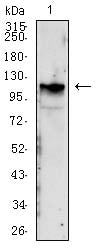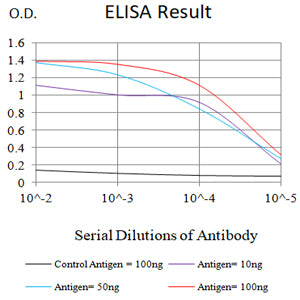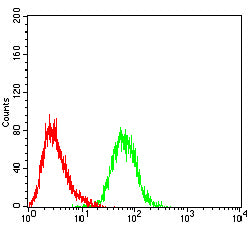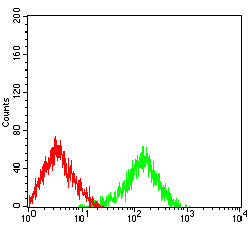



| WB | 1/500 - 1/2000 | Human,Mouse,Rat |
| IF | 咨询技术 | Human,Mouse,Rat |
| IHC | 咨询技术 | Human,Mouse,Rat |
| ICC | 技术咨询 | Human,Mouse,Rat |
| FCM | 1/200 - 1/400 | Human,Mouse,Rat |
| Elisa | 1/10000 | Human,Mouse,Rat |
| Aliases | IGFR; CD221; IGFIR; JTK13 |
| Entrez GeneID | 3480 |
| clone | 3B4E3 |
| WB Predicted band size | 154.8kDa |
| Host/Isotype | Mouse IgG2a |
| Antibody Type | Primary antibody |
| Storage | Store at 4°C short term. Aliquot and store at -20°C long term. Avoid freeze/thaw cycles. |
| Species Reactivity | Human |
| Immunogen | Purified recombinant fragment of human IGF1R (AA: extra(741-935)) expressed in E. Coli. |
| Formulation | Purified antibody in PBS with 0.05% sodium azide |
+ +
1. **"Targeting the insulin-like growth factor 1 receptor in cancer therapy"** by LeRoith D, et al.
- 摘要:综述了IGF1R在肿瘤生长和转移中的作用,探讨了多种IGF1R抗体的临床前及临床研究进展,强调其在乳腺癌、结直肠癌等癌症中的治疗潜力及面临的耐药性挑战。
2. **"Figitumumab (CP-751.871) in combination with paclitaxel and carboplatin in non-small cell lung cancer"** by Karp DD, et al.
- 摘要:该II期临床试验研究表明,IGF1R抗体figitumumab联合化疗药物可改善部分非小细胞肺癌患者的生存期,但后续III期试验因疗效不足终止,提示需进一步筛选获益人群。
3. **"Mechanisms of resistance to anti-IGF1R therapy in breast cancer"** by Ulanet DB, et al.
- 摘要:通过体外模型揭示乳腺癌细胞对IGF1R抗体(如cixutumumab)的耐药机制,包括PI3K/AKT/mTOR信号通路的代偿性激活,并提出联合靶向治疗可克服耐药。
4. **"Phase I study of dalotuzumab in combination with cetuximab and irinotecan in metastatic colorectal cancer"** by Di Cosimo S, et al.
- 摘要:评估IGF1R抗体dalotuzumab联合EGFR抑制剂西妥昔单抗及化疗的安全性,结果显示部分患者肿瘤缩小,但高血糖等代谢副作用限制了其临床应用。
The insulin-like growth factor 1 receptor (IGF1R) is a transmembrane tyrosine kinase receptor that plays a critical role in regulating cell growth, proliferation, survival, and metabolism. Structurally, it consists of two extracellular α-subunits for ligand binding and two transmembrane β-subunits with kinase activity. Upon activation by ligands (IGF-1. IGF-2. or insulin at high concentrations), IGF1R initiates downstream signaling pathways, including PI3K-AKT and RAS-MAPK, which are frequently dysregulated in cancer. Overexpression or aberrant activation of IGF1R is implicated in tumorigenesis, metastasis, and resistance to therapies in various cancers, such as breast, colorectal, and lung cancers.
IGF1R-targeting antibodies are therapeutic agents designed to block ligand-receptor interactions or receptor dimerization, thereby inhibiting oncogenic signaling. Early monoclonal antibodies (e.g., cixutumumab, figitumumab) showed preclinical promise but faced mixed clinical outcomes due to tumor heterogeneity, compensatory signaling (e.g., via insulin receptor isoforms), and toxicity concerns. Recent strategies focus on combination therapies (e.g., with chemotherapy or immune checkpoint inhibitors) or antibody-drug conjugates to enhance efficacy. Challenges remain in patient stratification and overcoming resistance mechanisms. Despite setbacks, IGF1R remains a compelling target, with ongoing research exploring bispecific antibodies and predictive biomarkers to refine its therapeutic potential in precision oncology.
×